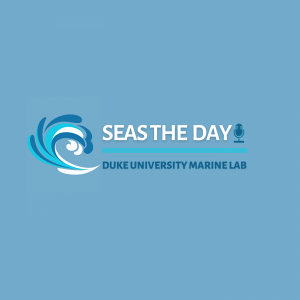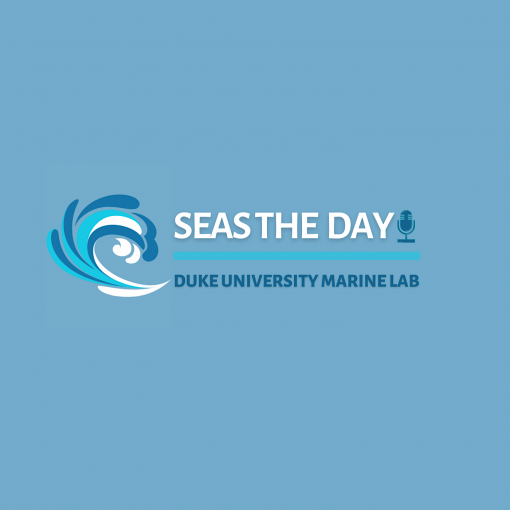On this episode Marissa Garcia, Uma Govindswamy, and Connor Johnston discuss the past, present, and future relationship between human beings and the endangered Southern Resident Killer Whale who inhabit the coastal waters of the Pacific Northwest.
Listen Now
Episode Hosts
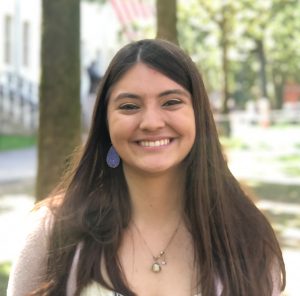
Marissa Garcia is a senior at Harvard University concentrating in Integrative Biology with a secondary in Environmental Science & Public Policy. She considers conservation to be the pulse behind her research in marine bioacoustics, wherein she studies the vocalizations of the North Atlantic Right Whale, which currently has a population of fewer than 411. She strives to use the soundscapes of the sea to better inform environmental and marine policy in support of conservation. She strongly believes the roles of scientist and communicator can no longer be separate and therefore also dedicates her time to being Editor-in-Chief for the Harvard Independent and a writing intern for the National Oceanic and Atmospheric Administration (NOAA). She also serves as the President of the Harvard College Conservation Society. In a non-pandemic world, you can catch her coffeehouse hopping, unabashedly on the hunt for maple oat milk lattes and pastries with pistachios.
Twitter: @mari_lynn24
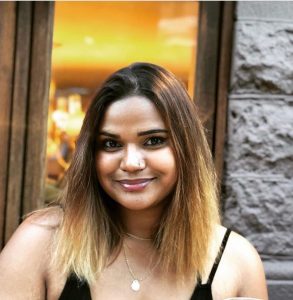
Uma Govindswamy is an undergraduate senior from New Delhi, India, enrolled in Trinity College of Arts and Sciences. She grew up between New Delhi and Washington D.C, and came to North Carolina in 2016 to pursue a B.S in Biology (with a concentration in Marine Biology), and a B.A in Global Health (with a concentration in Maternal and Child Health). She has worked as an independent journalist and consultant for organizations such as BRIGHT Magazine and the World Bank Group primarily focused on health and human rights. She will be graduating in May of 2021 and intends to work in policy – likely either health or environmental before pursuing a J.D.
Twitter & Instagram: @hereisuma
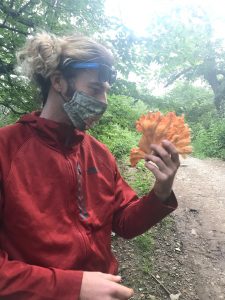
Connor Johnston is a mechanical engineer studying conservation technology and plant structure.
Interviewees
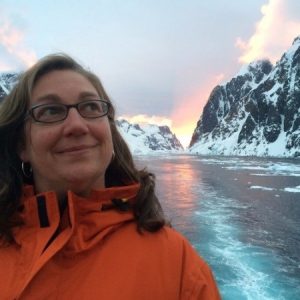
Lynn Barre
Lynn Barre is the Branch Chief of the Protected Resources Division of NOAA Fisheries’ West Coast Regional Office and a marine biologist focused on marine mammals. She has worked on Southern Resident killer whale recovery since 2003.
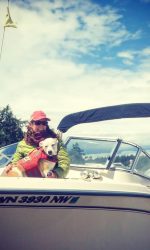
Deborah Giles, Ph.D.
Dr. Giles is a Resident Scientist at the University of Washington’s Friday Harbor Lab. She teaches classes on marine mammals of the Salish Sea and on marine biology. Dr. Giles’ other activities include acting as the science and research director with the volunteer non-profit Wild Orca and serving as the killer whale scientific adviser for the Orca Salmon Alliance.
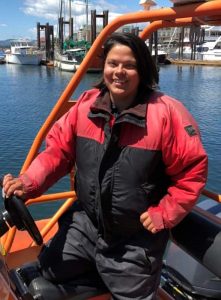
Laas Parnell
Laas Parnell is a marine naturalist and a member of the native group Haida, born and raised on Haida Gwaii near the Canadian coast. She also spent two years working as “Light Keeper” of Race Rocks Lighthouse and Ecological Reserve and is an experienced photographer.
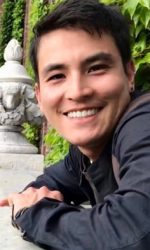
Will Sano
Will Sano is a Ph.D. student working with the Center for Conservation Biology. His work focuses on investigating the gut microbiome of reproductive of female Southern Resident killer whales in the Salish Sea.
Series Host
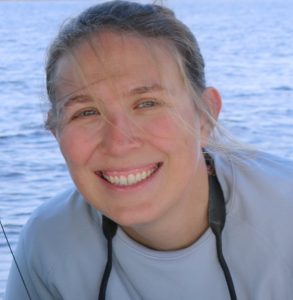
Dr. Reny Tyson Moore host the Whale Pod series. She is a broadly trained interdisciplinary behavioral ecologist with expertise in marine mammal bioacoustics, photographic-identification, population biology, and bio-logging tools and techniques. She is currently a staff scientist with Chicago Zoological Society’s Sarasota Dolphin Research Program and a contractor for NOAA Fisheries Office of Protected Resources through Ocean Associates Inc. Reny received her PhD from Duke University in Marine Science and Conservation, where she used high-resolution acoustic and movement tags to study the fine-scale foraging behaviors of humpback whales along the Antarctic Western Peninsula. Before this, Reny obtained her BSc and MSc from Florida State University where she examined nonlinearites in cetacean vocalizations and determined the abundance and community structure of bottlenose dolphins in the Big Bend of Florida. She went on to apply her skills as a Postdoctoral Research Fellow and Scientific Committee of Antarctic Science Fellow at the Institute for Marine and Antarctic Science, based at the University of Tasmania in Hobart, Australia, and then as a postdoctoral scientist with the Chicago Zoological Society’s Sarasota Dolphin Research Program. Reny has published or been a co-author on many peer- reviewed scientific articles, technical reports, conference papers, children’s books, and conference and workshop presentations. She also serves as a mentor and teacher for undergraduate and graduate students at various institutions, including the Duke University Marine Lab.
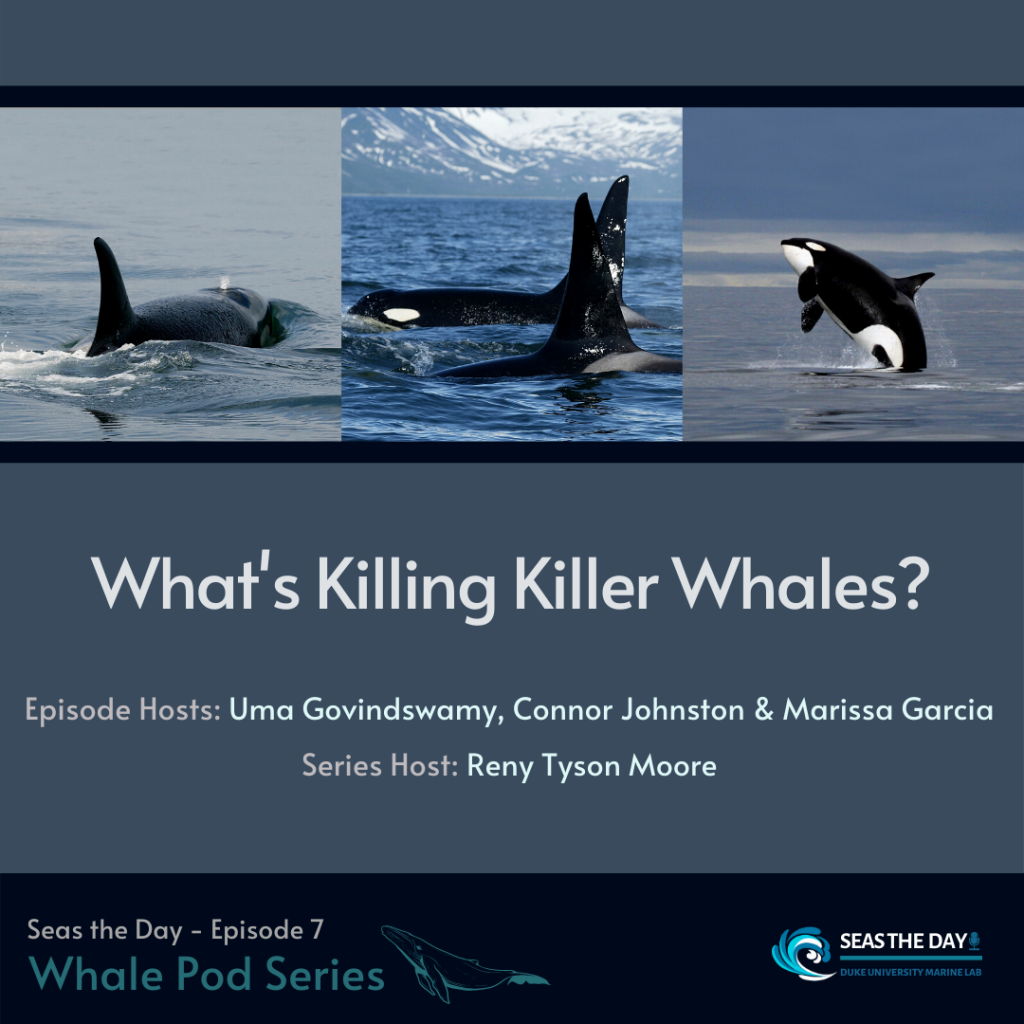
Supplemental material for this episode
Oyster Waltz by Joe Morton plays
Reny Tyson Moore: Hello again and welcome to Seas the Day, a podcast from the Duke University Marine Lab. My name is Reny Tyson Moore and I will be your host for today as we bring you the second episode from our Whale Pod Series. Yeah, I know, if you listened in last week you may have noticed that we talked about the Taiwanese white dolphin, which is in fact not a whale. The pun “Whale Pod” was just too good for us to pass up as a series name. But don’t worry: we will have episodes on various marine mammal species – including whales, dolphins and pinnipeds in this series. We will not discriminate!
Anyway, to get you back up to speed, this series features episodes produced by students who participate in the summer session of the Marine Mammal Science and Conservation course I teach through the Duke University Marine Lab. These episodes serve as the student’s final term projects and give them an opportunity to dive deeper (yes, I went there) into a marine mammal conservation story of their choosing and to chat one-on-one with experts in marine mammal science about their selected issue. Remarkably, the student’s pull all of this off, along with other assignments and readings, in just six, virtual discussion filled weeks.
This week’s episode focuses on the endangered southern resident whales who inhabit the coastal waters of the Pacific northwest. It was produced by Uma Govindswamy and Connor Johnston, undergraduate students from Duke University and Marissa Garcia, a visiting undergraduate student from Harvard University. In this episode Uma, Conner and Marissa chat with marine mammal experts Lass Parnell, Lynne Barr, Deborah Giles and Will Sano about the plight of the southern resident whales, and focus on how decreases in killer whale prey, such as chinook salmon, and increases in pollutants and corresponding toxin loads have impacted their reproduction and ultimately growth of their populations. They also discuss the importance of killer whales to the culture of indigenous tribes in this region and recommend things we can all do to protect the habitat conditions of endangered species such as the Southern Resident whales. With that, I will let Uma, Connor and Marrissa take it away.
Uma: On this week’s episode, we discuss the endangered Southern Resident Killer Whales who inhabit the coastal waters of the Pacific Northwest. We interviewed Lynne Barre, the Branch Chief for Protected Resources Division for NOAA’s West Coast Regional Office, Dr. Deborah Giles at the University of Washington Center for Conservation Biology, Will Sano, who is a Ph.D. student at the Center for Conservation Biology, and Laas Parnell, a marine naturalist and member of the native group Haida located on Haida Gwaii island off the Canadian coast.
Our story begins with Tahlequah, a female killer whale in J pod of the Southern Residents. In 2018, she gave birth to a female calf, a blessing given that the Southern Residents’ population has decreased to 74 from their 2005 estimate of 98. But after only 30 minutes, her calf had died. In what can only be extreme grief, Tahlequah carried her calf for 17 days and over 1,000 miles before letting it float to the bottom of the ocean. Her historic swim captured national attention and prompted the Seattle Times to write a series of articles delineating the plight of the Southern Residents. The title:“Hostile Waters: Orcas in Peril.”
We learned more about the history of these whales while reading this series, and we also discovered a surprising truth: these whales used to be hated. As whale lovers, we were shocked. But according to the articles, fisheries used to openly hunt the whales because they regularly stole catch from them, sometimes taking 50-100% of a single catch according to a paper published in 2008 by the National Marine Fisheries Service titled “Recovery plan for southern resident killer whales”. Angered by the whales’ love of fish, fisheries in British Columbia would opportunistically shoot the animals. The U.S. Navy even established a program to use them for target practice, although these shootings occurred in the Atlantic near Iceland. We were appalled. But even more appalling was that these attitudes were held by non-native settlers. In contrast, indigenous tribes considered the whales to be sacred and interwove their images throughout their culture. Laas Parnell, a marine naturalist and member of the native group Haida located on Haida Gwaii, an island off the Canadian coast, explains the importance of killer whales to her culture.
Parnell: Well, I’ve always loved marine life and marine science, and that’s definitely due to my culture and growing up on Haida Gwaii, because it is a beautiful island. And most of it is protected. And especially the killer whales, for example, are a huge part of the culture, they’ve always been very respected because they’re in a lot of stories, myths, legends. And they’re also used as part of a crest that represents a certain family. And if you have a killer whale as a crest, you know, then you see the people that do, they have, like, all these jewelry and tattoos of killer whales and it’s very symbolic. They’re part of a lot of stories, mostly because a lot of Haida’s stories do have to do with the ocean and the killer whales were seen as, I guess, kind of like the guardians of that world. Like they were the family that basically protected the underworld, as they would call the ocean. So a lot of stories have to do with people traveling there or the killer whales helping someone or even kidnapping people, but yeah, there’s tons of stories about them. A lot of them have to do with their strength and their power. They’re seen as supernatural creatures that were huge and smart and they have these abilities, like they were very respected among Haida people.
Uma: Despite the importance of these whales to indigenous cultures, it wasn’t until the capture of killer whales for aquaria that the Euro-American attitude switched from one of outright hostility to admiration. Still, we found that 55 orcas were captured in the pacific northwest for aquaria between 1962 and 1977. 48 were from the Southern Residents, according to the National Marine Fisheries Service in 2008. It wasn’t until 1976 that the capture of these whales was banned in the region. While the whale population was able to recover to pre-capture levels of 98 individuals in 1995, their population has since declined to 74. The reason is high infant mortality caused by malnourished mothers. Here’s Dr. Deborah Giles, Research Director of the non-profit Wild Orca, talking more about these miscarriages caused by limited food resources.
Giles: The most recent paper that came out from the work we do is, Dr. Wasser was the lead author on this one, and this came out in… I can’t believe it’s already been three years already, but July of 2017. And that one showed from all of the fecal samples that we had collected of females that were pregnant, 69 percent of those pregnancies were lost prior to the calf being born viable. And or right after, this female would give birth and then it [the baby] would die. And, that’s got really important impacts and implications for the recovery of this population that is already so small. Not only is the female gestating a calf and then putting that energy, more and more we are realizing the emotional energy as well as the physical energy into gestating that calf. But it also becomes sort of dangerous to pass a dead fetus. Because the bigger it is, the harder it is for the females to expel that dead fetus. And so that’s really important work, and also that work was tied very closely to nutritional deficit. So females that were not getting enough to eat are the ones that are aborting or spontaneously miscarrying their calf.
Uma: To reiterate, 69% of pregnancies are lost. Under normal circumstances, these whales are a species that have only 4 to 6 offspring in their lifetime according to the Museum of Zoology at the University of Michigan. We were astounded to then find that these whales now only have between 0 and 2 offspring in a lifetime. This number is hardly enough to sustain the population at its currently reduced size, and is part of what classifies these whales as endangered. According to the National Marine Fisheries Service in 2008, their probability of extinction in the next 100 years ranges from 0 to 19%. But how do the researchers know that these whales are malnourished? The answer, as with many environmental scientists, is poop. Dr. Deborah Giles and others use trained dogs to sniff out the whale poop and direct research boats to its location. Dr. Giles was actually walking one of these dogs during her interview, whose name is Eba and has a larger social media presence than any of us. But I digress. Finding whale poop, however, isn’t easy. It can depend on the wind, water conditions, and even the composition of the fecal sample. Here’s Dr. Giles discussing killer whale fecal samples as she walks Eba along the beach.
Giles: There’s a little bit of breeziness, which is actually ideal conditions right now on the water. A fatty fecal sample with water like this would stay on the water for up to 30 minutes or more. But, and then you notice that use of the word fatty. The more the whales are eating, the more fat they can give up in a fecal sample, just like you and me, you know, we’re eating a lot of healthy, good food and we’re getting enough nutrients. We’re going to be able to let that some of that go in the form of a bowel movement. When the whales are not getting enough to eat, we end up finding these very watery and diffuse fecal samples that are challenging to get the dog to smell. Sometimes we can’t even smell them, we just can’t find it. In the water column, it’s too watery. It’s like diarrhea. It is diarrhea. That’s another analysis that we’re going to actually find our legacy samples to see whether or not we can actually look at fat content and the descriptors that we use to talk about the sample. Because we use things like fatty or goopy or chunky, wispy, things like that. And so we want to be able to go back and compare our descriptor notes that we take when we collect them with the fat content that is actually in that sample.
Uma: These whales are so hungry that their poop is literally diarrhea. So saving these whales from starving to death, depends on saving their food. Connor Johnston explains more about how the Southern Resident’s food source has drastically changed.
Connor: When we first started investigating the Southern Resident killer whales, we were surprised to find that they only eat fish. Specifically, they prefer to feast upon Chinook salmon, a fish that once ruled the waters on the west coast. In fact, there was enough salmon to support a population of over 200 Southern Resident Killer Whales, according to National Marine Fisheries Service et. al. 2008. But today the EPA estimates the Chinook salmon population to be 10% of its historic abundance. In some areas, it’s as low as 1%. Here’s Lynne Barre, Branch Chief for Protected Resources for NOAA on the West Coast talking about one of the largest salmon runs that has since disappeared.
Barre: There are definitely some California rivers that were once, you know, much bigger producers, and the whales still do make trips down to California as part of their range and we have data on what fish they’re eating in the Monterey area. So, California is important. And I think that goes into this portfolio approach that we need a variety of salmon to really support a full diet for the whales.
Connor: When she said California, I was shocked. As someone who grew up in San Francisco, I had never thought of California as a salmon state. But I soon found out that the Sacramento River used to be the second largest salmon run in the entire U.S. And more importantly, it supplied a crucial source of food to the whales when they traveled South for the winter. But without this important food source, the whales are struggling to build up enough fat to survive, let alone raise calves. But that’s not the end of it. Dr. Giles explains more about historic salmon size.
Giles: These whales evolved hundreds of thousands of years ago to eat Pacific salmon. And these were salmon that would have been a hundred or more pounds each.
Connor: A hundred-pound salmon? That would be larger than a German shepherd, which is crazy because today’s salmon average only 20 pounds. So for these whales to get enough food, they have to complete 5 times as many foraging dives, which burns extra fat they need for gestating and raising calves. If salmon continue to shrink in size as they currently are, these whales will eventually reach the tipping point where they burn more energy than they get from a foraging dive. We seem to have already passed this threshold for the energy needed for calf-rearing, as shown by Tahlequah, but if it happens for just surviving, the whales might go extinct sooner than we think. Which brings up the question: what happened to the salmon? Why are they declining? The EPA cites habitat change or damming of rivers where salmon breed, harvest rates, and hatcheries as the main drivers behind the reduction in salmon population. Here’s Lynne Barre talking about salmon recovery efforts on the west coast.
Barre: Salmon recovery up and down the coast is a huge effort because there are so many complex threats for those salmon, whether it be habitat restoration and freshwater systems or dealing with hydro power operations on rivers. Hatchery Programs can benefit whales by creating more fish, but also we need to balance that with protecting wild populations of salmon. And also our management of harvest that affects the salmon levels that are available to the whales. Some of those are short term like an annual fishery management view, but some are very long term as far as habitat restoration and rebuilding some of the salmon stocks that are also listed as threatened or endangered.
Connor: But despite removing dams and breeding millions of fish in hatcheries, salmon populations have not rebounded. And the efforts don’t even mention restoring salmon size. But in fact, restoring salmon size might be the key to restoring their population numbers. According to a paper titled ‘Demographic changes in Chinook salmon across the Northeast Pacific Ocean’ by Jan Ohlberger released in 2018, selective harvesting of older, larger fish can lead to population decline. The decline occurs because smaller, younger fish have lower fecundity and lower offspring survival, and may not be able to dig deep enough to protect their eggs from damage. So in fact, releasing large salmon that are caught may be the answer to both increasing the size and population of salmon. Laas Parnell offers another solution for recovering salmon population.
Parnell: Yeah, I think everything right now just has to do with the food chain because that’s where the big issue is. Right? So everything down from what the herring needs, to the herring population, to the Chinook salmon, to the killer whale. The whole chain and how you can support that food chain is, I think, what the focus should be on right now because people aren’t really thinking about the herring. Actually, yeah, it was… a few years ago the First Nations people tried to stop overfishing of herring because they were being overfished by commercial fisheries. And the First Nations went out on their boats and they created a blockade saying you can’t fish for herring here. It was effective for bit but Department of Fisheries and Oceans, they just were no help at all because they were the ones who opened herring fishing. But yeah, because it’s the herring that feed the Chinook, and then the Chinook that feed the killer whales, and that’s what the killer whales are depending on right now. That’s what the southern residents need, is they just need food because they’re starving to death.
Connor: But in reality, this problem is too large for a single-solution solve-all scenario. What we need is for all of these efforts to occur simultaneously and at a large scale in order to make a difference. There was still one thing that was puzzling us, though. Despite the decline of salmon, the killer whales have not sought another food source. Marissa Garcia explains more about how culture prevents the whales from seeking an alternative food source.
Marissa: So, in fact, there are three types of killer whales: offshores, transients, and residents. And each one has a different set of eating preferences, calls, and geolocation. If we’re talking specifically about food: offshores eat sharks, transients eat mammals, and residents, the ones we are focusing on, eat fish. Here’s Dr. Giles explaining the evolution of their eating preferences.
Giles: Killer whale culture is this question about the chicken and the egg. Which came first, the killer whale culture or the eating of the fish? So with the coevolution and the culture of not teaching the offspring to eat other things is wrapped up in that evolutionary history of this population. But so is eating mammals for transients, transients don’t see fish as food. And I think that that goes way back in evolutionary time and the way that these populations, as they were speciating, because really they should be subspecies of one another. I think that that happened because they were habitat partitioning by way of changing, eating at different levels of the food web. And they were able to be physically occupying the same geographic regions but they were not competing with each other for the same food.
Marissa: But even despite these different evolutionary histories, the Southern Residents are starving. What’s stopping them from branching out? Dr. Giles shares more.
Giles: Here’s a little anecdotal story for you. When the capture era was still going on, some of the last whales that they captured were male and female, mother and son, mammal-eater, transients T13 and T14. They went for weeks and weeks and weeks. And it might have even been like, well, like a month or more of not eating. They would not eat the fish that were offered to them. They separated T14 because they wanted to, it was determined that he was less than an inch too long to take out of the wild. But they decided that they would put a radio transmitter on him. So they bolted this massive piece of equipment to his dorsal fin, super barbaric, but they did it. And when they had him separated, they actually got him to eat fish. When they put him back in the net pen with his mom and offered them fish again, she beat the crap out of him. She would not let him eat it even though they were starving.
Marissa: Ultimately, culture outweighs survival for these whales. Although researchers like Dr. Giles still hope that one of them will take a bite out of a marine mammal, what we need to do is give the whales what they need: salmon. And Dr. Giles wants to do just that.
Giles: So first, let me say that the fact that we can collect and then examine nutritional hormone levels in the feces, we’ve been doing that since 2007. And it’s very clear that the whales are not getting enough to eat. It’s very obvious in the markers that we’re seeing in their nutritional profiles. You’d think that that would be enough to really drive policy. But so far, it has not been. I’m hoping that with additional analysis on gut biome we’ll certainly be able to paint a bigger picture or place more puzzle pieces and be able to make additional comments to policymakers. The most frustrating thing to date is that right now the whales, my group, my Wild Orca group. So this is my advocacy hat. Our campaign is called the Fair Fisheries Campaign. And what that saying is, is that our claim is that the Southern resident killer whales and other fish-eating killer whales were the original harvesters of the Pacific salmon. And as such, they should be given a place at the table and allocated a portion.
Marissa: Give the killer whales a place at the table. As weird as that may initially seem, its simplicity is alluring. And it’s the kind of political thought these whales need, since their voices are not listened to because they’re not human. What it will take though, is researchers speaking for them, learning their behaviors and cultures so they can communicate these whales’ needs effectively to policy makers. Will Sano, a PhD student who works with Dr. Giles, is doing just this. He’s about to begin research on the killer whale’s microbiome, which he hopes will provide more information about the southern resident’s reproduction rates. To what extent do these killer whales take up toxins, and does this ultimately result in miscarriages? Here he is talking more about this research, and get ready, because it gets a little bit technical.
Sano: At this point it’s not uncommon to go a year without new calves in the southern resident population. So I’m interested in gaining a better understanding of what is happening with these reproductive failures, and we know that the gut microbiome is hugely important to maternal health in humans. It’s something that’s well documented, it changes in composition throughout the course of gestation to support the bulking up of fat that mothers need to create the milk for their young, it supports the immune system of the mother prison to prevent fetal infection. These are things we know about human health and the microbiome, but we know absolutely nothing about the southern resident killer whales’ microbiome and how that may be interacting with maternal health and also with the other variables in the system. So we have prey availability, we know the microbiome is influenced by diet, we have toxin exposure to PCBs, polychlorinated biphenyls. Those are well known endocrine disruptors and they can interfere with the hormone signaling between the microbiome and their host. So this is a hugely complex problem. We’re hoping to sort of add another tool to our tool kit and see where that gets us with our ability to figure out exactly why these Southern residents are miscarrying their pregnancies.
Marissa: So what Will is studying is whether toxins in the environment, specifically PCBs, are possibly causing miscarriages. This toxin is the result of industrial waste in the 1960s and is found in water and soil around the world. When these whales are starving, they are burning their fat stores which releases PCBs into the blood, which is bad news for the whale because these PCBs have been known to block hormones, and in the case of pregnancy, hormones that may be crucial to the performance of the stomach microbiome. So ultimately what Will is trying to determine, is if the gut microbiome of a pregnant whale that is starving is different from that of one that isn’t.
If that was hard to follow, it’s probably because you’re not getting a Ph.D. in a marine biological field. But this is the type of research that is currently going on to try and convince policymakers to protect these whales. And while it’s important, there is the saying “Don’t let perfect be the enemy of the good.” While Will’s research is definitely important for further understanding these whales, there is already plenty of data to take action right now. As we wrap up our podcast, we wanted to conclude with a statement from Lynne Barre. Lynne Barre offers advice for how even you can make a difference for these whales.
Barre: Because the southern residents and the threats are so far reaching and wide ranging, I like to think of that as an opportunity for almost anyone to get involved in the recovery program. Some things people can do are volunteer in their own watersheds to do salmon habitat restoration, to make great decisions about products you use on your lawn, or how you commute or use energy and water. So some of those all really connect to the salmon and also the whales themselves in improving the habitat conditions. To promote responsible boating around the whales and educate people about the regulations and other guidelines to follow, we have a “be whale wise” campaign. So that’s, bewhalewise.org is a place people can go to learn more about that. And we also promote land based viewing of the southern residents and other whales and marine mammals in our region. Since they do closely pass by some popular spots like a, there’s a park on the West side of San Juan Islands, where there’s some great land-based viewing. So lots of things people can do. Learn more, participate when we have public comment periods. Many of our regulatory processes include a public input component. So that’s another way to learn about what’s being done to help the whales and to provide input and yeah, just decisions you make as a homeowner, as a commuter, as a consumer, as a voter. Those can all contribute to the recovery of our ecosystem and our species like the salmon and the southern resident killer whales.
Oyster Waltz by Joe Morton plays
Reny Tyson Moore: You’ve been listening to Seas the Day, and the second episode in our Whale Pod Series. Today’s episode was written and produced by Uma Govindswamy, Connor Johnston, and Marissa Garcia. Brandon Gertz edited the podcast. For more information on our podcast visit our website: sites.nicholas.duke.edu/seastheday. You can also follow us on Twitter and Instagram at SeasTheDayPod. Our theme music was written and recorded by Joe Morton. Our artwork is by Stephanie Hillsgrove. Jeff Priddy provides us with technical support. If you enjoyed today’s show, please share it with a friend. Thanks for listening.
Ayres, K. L., Booth, R. K., Hempelmann, J. A., Koski, K. L., Emmon, C. K., & Baird, W. (2012). Distinguishing the Impacts of Inadequate Prey and Vessel Traffic on an Endangered Killer Whale (Orcinus orca) Population. Distinguishing the Impacts of Inadequate Prey and Vessel Traffic on an Endangered Killer Whale (Orcinus Orca) Population, 7 (6). doi:10.1371/journal.pone.0036842
Burham, R.E, Palm, R.S, Duffus, D.A, Mouy, X, & Riera, A. (2016). The combined use of visual and acoustic data collection techniques for winter killer whale ( Orcinus orca ) observations. Global Ecology and Conservation, 8, 24-30.
Colby, J. (2013). The Whale and the Region: Orca Capture and Environmentalism in the New Pacific Northwest. Journal of the Canadian Historical Assosiciation, 24 (2), 425-454. Retrieved May 15, 2014, from https://www.erudit.org/fr/revues/jcha/2013-v24-n2-jcha01408/1025084ar/.
Ferrara, G., Mongillo, T., Barre, L., & United States. National Marine Fisheries Service, issuing body. (2017). Reducing disturbance from vessels to southern resident killer whales: Assessing the effectiveness of the 2011 federal regulations in advancing recovery goals (NOAA technical memorandum NMFS-OPR ; 58). Seattle, Wash.]: U.S. Department of Commerce, National Oceanic and Atmospheric Administration, National Marine Fisheries Service, Northwest Regional Office. Fisheries, NOAA. (N.d.). Killer Whale. NOAA. https://www.fisheries.noaa.gov/species/killer-whale
Fisheries, NOAA. (2020, June 3). Southern Resident Killer Whale ( Orcinus orca ). NOAA. https://www.fisheries.noaa.gov/west-coast/endangered-species-conservation/southernresident-killer-whale-orcinus-orca#outreach-and-education-partners
Krahn, Margaret M, Bradley Hanson, M, Schorr, Gregory S, Emmons, Candice K, Burrows, Douglas G, Bolton, Jennie L, . . . Ylitalo, Gina M. (2009). Effects of age, sex and reproductive status on persistent organic pollutant concentrations in “Southern Resident” killer whales. Marine Pollution Bulletin, 58(10), 1522-1529.
Mapes, L. V. (2020, June 26). CHASING A MEMORY In California, orcas and salmon have become so scarce people have forgotten what once was. Will the Northwest be next? Retrieved July 6, 2020, from https://www.seattletimes.com/seattle-news/environment/hostile-waters-orcas-chase-amemory-of-salmon-to-california/
Morin, O., & Branchereau, G. (2019, January 28). Climate change pushing killer whales to migrate north. Retrieved July 6, 2020, from https://phys.org/news/2019-01-climate-killer-whales-migrate-north.html
Staff, S. T. (2019, December 19). Hostile Waters: Orcas in peril. Retrieved July 6, 2020, from https://www.seattletimes.com/seattle-news/environment/hostile-waters-orcas-killer-whale-puget-sound-washington-canada/
Ward, E., & Northwest Fisheries Science Center, issuing body. (2013). Estimating the impacts of Chinook salmon abundance and prey removal by ocean fishing on southern resident killer whale population dynamics (NOAA technical memorandum NMFS-NWFSC ; 123). Seattle, Washington: U.S. Department of Commerce, National Oceanic and Atmospheric Administration, National Marine Fisheries Service Northwest Fisheries Science Center.
Wasser, Samuel K, Lundin, Jessica I, Ayres, Katherine, Seely, Elizabeth, Giles, Deborah, Balcomb, Kenneth, . . . Booth, Rebecca. (2017). Population growth is limited by nutritional impacts on pregnancy success in endangered Southern Resident killer whales (Orcinus orca). PloS One, 12(6), E0179824.
Williams, Rob, Lusseau, David, & Hammond, Philip S. (2006). Estimating relative energetic costs of human disturbance to killer whales ( Orcinus orca). Biological Conservation, 133(3), 301-311. https://www.epa.gov/salish-sea/chinook-salmon

